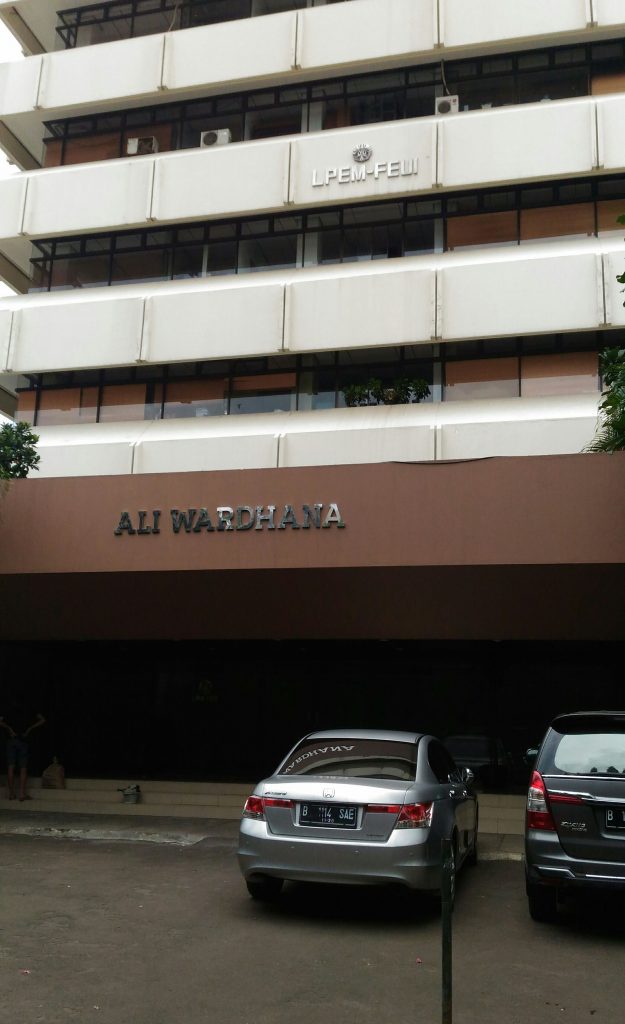 In 1953, Prof. Dr. Soemitro Djojohadikusumo as the Dean of Faculty of Economy of University of Indonesia (now the name become Faculty of Economics and Business), established 2 research centers: Business Administration Seminar and Social Research Centre, to support research done by doctoral candidates in the school. In November 1953, the Social Research Centre became the Institute for Economic and Social Research (LPEM-FEUI, or “LPEM”). In 1956 the Business Administration Seminar merged into LPEM.
In 1953, Prof. Dr. Soemitro Djojohadikusumo as the Dean of Faculty of Economy of University of Indonesia (now the name become Faculty of Economics and Business), established 2 research centers: Business Administration Seminar and Social Research Centre, to support research done by doctoral candidates in the school. In November 1953, the Social Research Centre became the Institute for Economic and Social Research (LPEM-FEUI, or “LPEM”). In 1956 the Business Administration Seminar merged into LPEM.
Now LPEM undertakes research, consulting, and training aimed at solving development problems for the benefit of Indonesian society. These activities are based on strong research culture that includes the application of theories in analyzing, understanding, and providing policy recommendations. Supported by research staff holding advanced degrees from best universities, both domestic and abroad, LPEM is always ready to help provide solutions to the problems of Indonesia.
Research and consultation are the main activities of the Institute. Most of them are conducted in cooperation with other parties. Our partners are government or private institutions with domestic or foreign affiliation. During the last 30 years, LPEM has completed more than 450 research projects covering a wide range of areas, such as institutional problems, regional economics, international economic relations, international trade, finance and banking, fiscal and monetary economics, agriculture, industry, tourism, rural development, demography, labor, poverty, income distribution, small-scale enterprises, and cooperatives.
LPEM also conducts seminars, both regular and non-regular seminars at national and international level. Examples include past annual seminar sponsored by United States Agency for International Development (USAID), the recent annual seminar series on competitiveness with Japan Bank for International Cooperation (JBIC), the annual academic seminar in cooperation with the Australian National University (ANU), and the Sadli Lecture (seminar) series. Our research projects are mostly policy oriented research that provide crucial inputs to policy makers, ranging from the preparation of the national, regional, and district-level development planning to more operational policy formulation in various aspects and sectors of development.
LPEM has a long history of working with private sector. In the 1990s the cooperation with the private sector had increased, as firms face the need to be more efficient in the global era. Since the outbreak of the economic crisis in 1997, the need to restructure corporations in Indonesia has become even more important. In this area, LPEM is also active in advocacy and consulting activities. Anticipating further economic development and increasing demand for high research quality, LPEM established two divisions of research: Economic and Policy Research Division; and Infrastructure and Regional Development Research Division.
The Education and Training Division was established to provide services to increase the quality of human resources (mainly of government officials). The division has conducted various activities since 1978 and also a series of national and international seminars. Participants of the education and training programs come from various regions with government or private sector affiliation. The education activities are divided into “regular” trainings conducted every year and “non-regular” trainings that are held as requested by clients. The most frequent courses/trainings include National Planning Program, Development Planning Techniques, and Support Function Planning. These activities are generally conducted in 1-6 months. There are also shorter trainings (1-2 weeks) with specific topics such as Participation Planning, Potential of Regional Economy, Public Policy Analysis, Project Monitoring and Evaluation, Public Development, and Regional Finance and Budgeting.
To adapt with new challenges, LPEM restructured its board of directors and create seven research groups. The board of directors now consist of a director, an associate director of research, an associate director of training and an associate director of administration and finance. The seven research groups are Industrial Economics and Infrastructure, Regional and Energy Resources Policy, Macroeconomics and Financial Sector Policy, Environmental Economics, Public Economics and Public Policy, Poverty and Social Protection and Social and Community Empowerment research group. Division into regular and non-regular trainings is still persisting until now. Regular trainings now consist of regulatory impact assessment training, introductory econometrics training and STATA data management training. Non-regular training is divided by trainings related to planning (functional planner training, regional development planning training, etc.), public finance (regional finance training, regional finance exercises training, etc.), public policy (public policy basic analysis training, public policy advanced analysis training, etc.), economics and social (macroeconomics analysis training, international trade training, social mapping training, conflict management training, etc.) and methodology (statistics I and II trainings, advanced and basic econometrics trainings, etc.)
